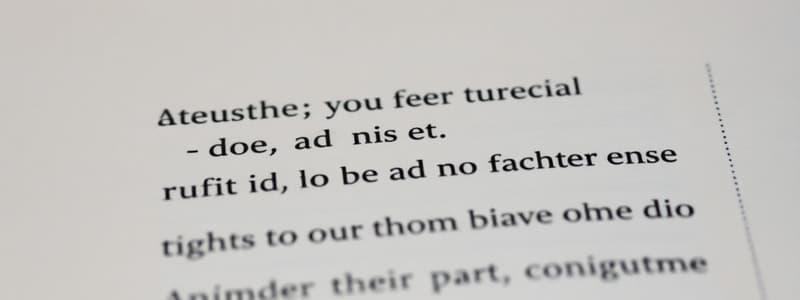Podcast
Questions and Answers
What role do adverbs primarily play within a sentence?
What role do adverbs primarily play within a sentence?
- They modify verbs, adjectives, or other adverbs. (correct)
- They describe nouns.
- They express a complete thought.
- They serve as conjunctions between clauses.
Which of the following is NOT a type of adverb?
Which of the following is NOT a type of adverb?
- Adverbs of place
- Adverbs of frequency
- Adverbs of manner
- Adverbs of conjunction (correct)
How do adverbs enhance a sentence?
How do adverbs enhance a sentence?
- They clarify the subject of the sentence.
- They change the form of the verbs.
- They indicate the mood of the sentence.
- They provide context about the time, place, manner, or degree. (correct)
Which sentence correctly uses an adverb?
Which sentence correctly uses an adverb?
What effect do adverbs have when improperly placed in a sentence?
What effect do adverbs have when improperly placed in a sentence?
Flashcards
What adverbs modify?
What adverbs modify?
Adverbs modify verbs, adjectives, and other adverbs.
What do adverbs do to a sentence?
What do adverbs do to a sentence?
Adverbs add detail and description to a sentence.
Types of adverbs
Types of adverbs
Adverbs can be classified by the information they provide, such as adverbs of manner, time, place, degree, and frequency.
Adverb of manner
Adverb of manner
Signup and view all the flashcards
Adverb of time
Adverb of time
Signup and view all the flashcards
Study Notes
What Adverbs Modify
- Adverbs modify verbs, adjectives, other adverbs, or entire clauses.
- Their function is to provide additional information about the action, state, or degree described by the words they modify.
What Adverbs Do to a Sentence
- Adverbs add detail and context to a sentence.
- They answer questions like: How? When? Where? To what extent? Why?
- They can change the meaning and nuance of an entire sentence or a specific part of it
- They can highlight specific details by indicating manner, time, place, or degree.
Types of Adverbs
-
Adverbs of Manner: Describe how an action is performed.
-
Examples: quickly, slowly, carefully, loudly, happily
-
Illustrative sentences:
-
She walked quickly.
-
He spoke angrily.
-
The dog barked loudly.
-
Adverbs of Time: Indicate when an action occurs.
-
Examples: now, later, tomorrow, yesterday, often, sometimes, seldom, usually, daily
-
Illustrative sentences:
-
I will visit you tomorrow.
-
She usually gets up early.
-
We go to the park occasionally.
-
Adverbs of Place: Indicate where an action occurs.
-
Examples: here, there, everywhere, nowhere, outside, inside, above, below, nearby, across
-
Illustrative sentences:
-
The cat is here.
-
They parked outside.
-
The bird flew above the clouds.
-
Adverbs of Frequency: Indicate how often an action occurs.
-
Examples: always, never, often, sometimes, usually, rarely, frequently
-
Illustrative sentences:
-
They always arrive on time.
-
We sometimes go to the movies.
-
I never eat spinach.
-
Adverbs of Degree/Quantity: Indicate the extent or intensity of an adjective or another adverb.
-
Examples: very, quite, extremely, almost, too, so, rather, slightly
-
Illustrative sentences:
-
The weather was extremely hot today.
-
She was quite happy with the result.
-
He was too tired to continue.
-
Adverbs of Reason/Purpose: Indicate why an action is taken.
-
Examples: therefore, consequently, thus, hence, accordingly
-
Illustrative sentences:
-
It rained heavily; therefore, the match was cancelled.
-
She studied hard; consequently, she got a good grade.
-
Conjunctive Adverbs: Connect and relate clauses within a sentence. These adverbs typically act as transition words.
-
Examples: however, moreover, therefore, nevertheless, otherwise, consequently, meanwhile, thus, instead
-
Illustrative sentences:
-
The weather was terrible; however, we went to the beach.
-
We tried our best; nevertheless, we lost the game.
-
She was tired; therefore, she went to bed early.
-
Sentence Adverbs: Modify an entire clause or sentence. They express attitudes, such as certainty, doubt, or surprise.
-
Examples: frankly, honestly, surprisingly, luckily, obviously, clearly, possibly, certainly
-
Illustrative sentences:
-
Frankly, I don't understand their decision.
-
Luckily, we arrived just in time.
-
Obviously, the solution is simple.
-
Interrogative Adverbs: Ask questions about manner, time, place, or degree.
-
Examples: how, when, where, why, how often, how long
-
Illustrative sentences:
-
How did you do that?
-
When will you be there?
-
Where are you going?
Studying That Suits You
Use AI to generate personalized quizzes and flashcards to suit your learning preferences.
Description
This quiz explores the role of adverbs in enhancing sentences by modifying verbs, adjectives, and other adverbs. It covers their functions, types, and how they can alter meaning and context. Perfect for honing your grammar skills!




